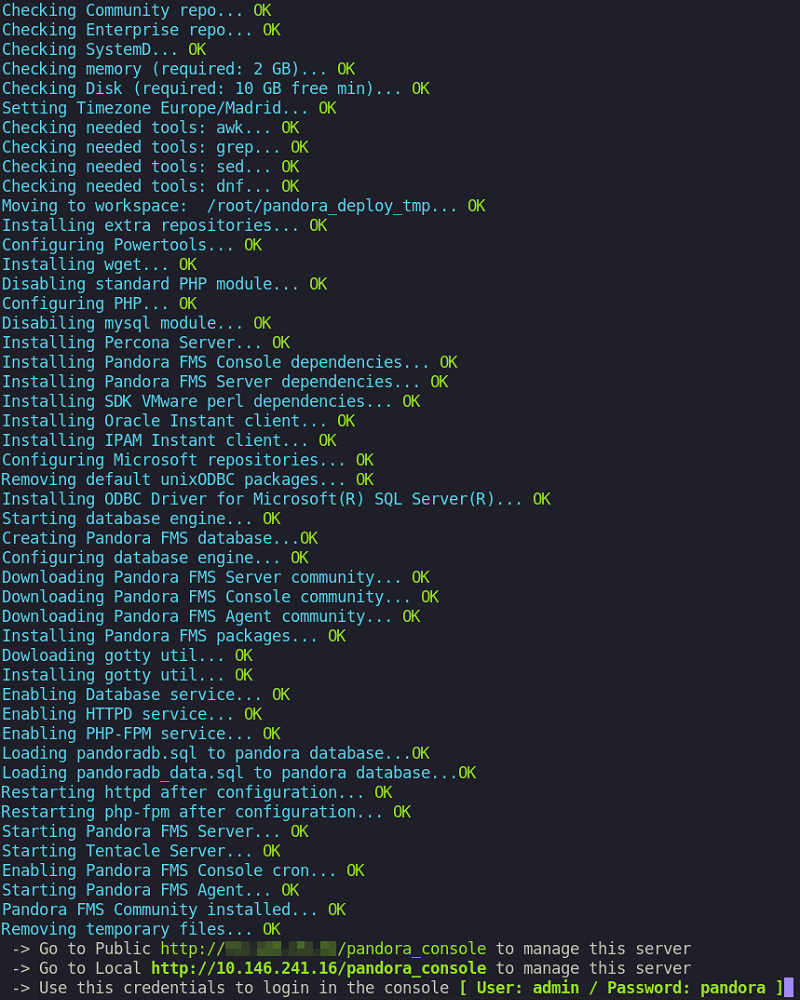Requirements for the Use of the Online Installation Tool
- Have access to the Internet. Specific web addresses:
- For the Open version (ICMP):
- firefly.pandoafms.com
- support.pandorafms.com
- For the Open version (HTTPS):
- https://pandorafms.com
- https://firefly.pandorafms.com/pandorafms/
- https://dl.fedoraproject.org/pub/epel/epel-release-latest-8.noarch.rpm
- https://rpms.remirepo.net
- https://repo.percona.com
- http//mirror.ghettoforge.org
- https://download.oracle.com
- https://packages.microsoft.com
- https://github.com/pandorafms/
- For the Enterprise version (HTTPS):
- For the Open version (ICMP):
- In addition to these URLs, it is necessary to have access to the official repositories of the distribution used (RHEL / Rocky Linux / Ubuntu).
- Having curl installed (it comes by default in most distributions).
- Meeting the minimum hardware requirements.
- Be root admin user.
- Have a supported SO.
- In case of using RHEL 8, it will be necessary to previously activate it with a license and subscribe it to the standard repositories.
To use the online installation tool, just access the command line of your Cloud provider, and by means of the root user, run:
In you use RHEL 8.x and Rocky Linux 8.x:
curl -sSL https://pfms.me/deploy-pandora-el8 | bashIn you use Ubuntu server 22.04:
curl -SsL https://pfms.me/deploy-pandora-ubuntu | bashThere is a similar online installation tool for Pandora FMS Enterprise version that you may request if you are a user of this version through the support portal or through this link get a free trial (demo). In addition, for Satellite server installation, there is an online installation tool too.
By means of this execution, the whole stack necessary for Pandora FMS will be installed, rendering an instance fully funtional to start monitoring.
You may get more information in our video tutorial «Cloud installers (agents, server)».
Custom installation using the online installation tool
Although the previous execution performs a full environment installation, it is possible to define different modifications through the environment variables to customize the installation.
These modifiers are:
- TZ: Define the time zone (time zone) of the machine, by default it is
Europe/Madrid. - DBHOST: The database host, by default
DBHOST=127.0.0.1. - DBNAME: The database name to be created, by default
DBNAME=pandora. - DBUSER: The database user will be created, by default
DBUSER=pandora. - DBPASS: The user password that will be created, by default
DBPASS=pandora. - DBPORT: Port number of the database to be connected, by default
DBPORT=3306. - DBROOTPASS: Database root user password, by default
DBROOTPASS=pandora. - SKIP_PRECHECK: Skip the check of whether there is an prior Pandora FMS installation, useful for creating a new database and pointing the installation to that one; by default
SKIP_PRECHECK=0. - SKIP_DATABASE_INSTALL: Skip the database installation, useful for having a database installed, whether local or remote and using its credentials for creating Pandora FMS database; by default
SKIP_DATABASE_INSTALL=0. - SKIP_KERNEL_OPTIMIZATIONS: Skip the recommended kernel optimization, only for advanced users. By default
SKIP_KERNEL_OPTIMIZATIONS=0. - MYVER: Define the MySQL version to be installed, if 80 is defined MySQL 8 will be installed. By default
MYVER=57(deploy MySQL 5.7). - PHPVER: Define PHP version to be installed, if 8 is defined, PHP 8 will be installed. By default
PHPVER=7(deploy PHP 7). - PANDORA_SERVER_PACKAGE: Define the URL of the RPM package of the Pandora FMS server you wish to install. By default, the last available version is defined.
- PANDORA_CONSOLE_PACKAGE: Define the URL of the RPM package of the Pandora FMS Web console you wish to install. The latest version available is defined by default.
- PANDORA_AGENT_PACKAGE: Define the URL of the RPM package of the Pandora FMS software agent you wish to install. The latest version available is defined by default.
- PANDORA_BETA: If defined to
1, the packages from the latest beta version available will be installed (only for test environments). By defaultPANDORA_BETA=0(if specific packages are defined, ignore this option).
Para el uso de estas variables de entorno basta con definirlas antes de ejecutar el script de instalación, por ejemplo, en una instalación en RHEL 8 con variables definidas ejecute el bloque:
env TZ='Europe/Madrid' \
DBHOST='127.0.0.1' \
DBNAME='pandora' \
DBUSER='pandora' \
DBPASS='pandora' \
DBPORT='3306' \
DBROOTPASS='pandora' \
MYVER=57 \
PHPVER=7 \
SKIP_PRECHECK=0 \
SKIP_DATABASE_INSTALL=0 \
SKIP_KERNEL_OPTIMIZATIONS=0 \
PANDORA_SERVER_PACKAGE="https://firefly.pandorafms.com/pandorafms/latest/RHEL_CentOS/pandorafms_server-7.0NG.noarch.rpm" \
PANDORA_CONSOLE_PACKAGE="https://firefly.pandorafms.com/pandorafms/latest/RHEL_CentOS/pandorafms_console-7.0NG.noarch.rpm" \
PANDORA_AGENT_PACKAGE="https://firefly.pandorafms.com/pandorafms/latest/RHEL_CentOS/pandorafms_agent_linux-7.0NG.noarch.rpm" \
PANDORA_BETA=0 \
sh -c "$(curl -fsSL https://pfms.me/deploy-pandora-el8)"
